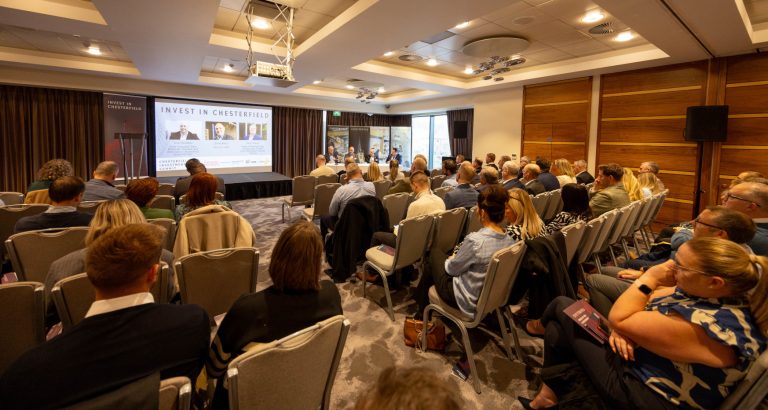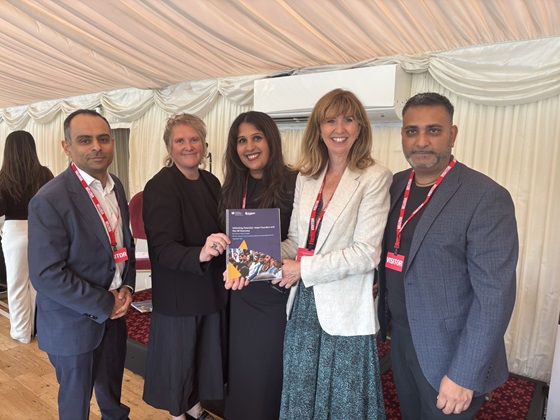Group expands into elderly care home market with Lincolnshire acquisition
Chesterfield delegates prioritise food, networking and convenience
A survey of 1,500 professionals conducted by Casa Hotel in Chesterfield has identified the elements delegates value most in business events. Networking and team-building topped the list, followed by venue and food quality. Long travel times, logistical challenges, and corporate jargon were cited as the main frustrations.
The research also highlighted emerging trends for 2025: wellbeing is gaining importance, jargon is increasingly off-putting, and convenience has become essential. Nearly a fifth of respondents identified excessive corporate language as a major turn-off, while more than a quarter flagged travel and parking as key concerns.
Casa Hotel, which recently marked its 15th anniversary and its 370,000th guest, has tailored facilities to meet these expectations. Meeting spaces are purpose-built, dining options feature locally sourced produce, and the location provides easy access to Chesterfield station and the M1. The hotel works closely with organisers to deliver customised event experiences.
Chesterfield is strengthening its reputation as a business events hub, offering a mix of heritage and modern venues suitable for conferences, corporate hospitality, and professional gatherings. Casa Hotel is part of Chesterfield Champions, a network of over 200 businesses, public sector organisations, and education providers that promotes collaboration, investment, and the town’s profile as a destination for commerce and events.
Asian-founded SMEs contribute £25bn but face systemic barriers
Asian-owned businesses contribute an estimated £25 billion to the UK economy and make up more than 6% of all SMEs, according to research by De Montfort University Leicester and Barclays Eagle Labs. The study involved 125 interviews with entrepreneurs, business leaders, and support organisations across England and Wales.
Findings highlight consistent obstacles to growth, including cultural attitudes towards debt and risk, investor bias, limited access to elite business networks, and challenges in securing finance. The research recommends tailored investment products, accelerator programmes, and targeted business support to address these barriers.
The Asian Founders Network, established in 2023 by DMU and Barclays Eagle Labs, has engaged over 1,000 entrepreneurs through events, roundtables, and networking sessions. The initiative aims to enhance recognition of Asian founders’ contributions and provide access to resources that support scaling and innovation.
The report highlights the potential for policymakers, investors, and business support organizations to boost economic growth by removing structural barriers for underrepresented entrepreneurs.
Eurocell “resilient” in subdued trading conditions
Eurocell plc, the manufacturer and distributor of door and window products to the trade, has reported a “resilient” financial performance, against subdued trading conditions.
According to results for the six months ended 30 June 2025, revenue increased to £193.2m, up from £175.7m in the same period last year.
Adjusted profit before tax, meanwhile, was down 3% at £7.8m, which the firm said reflected higher finance costs following its acquisition of Alunet. Eurocell noted that its full year outlook is now below previous expectations, “with trading conditions remaining subdued and continuing macroeconomic uncertainty impacting key markets.”Darren Waters, chief executive of Eurocell plc, said: “Our first half financial performance was resilient, in the context of trading conditions that remain subdued. We delivered an increase of 9% in adjusted operating profit despite lower organic volumes, thanks to a strong contribution from Alunet and effective cost control. Our cash generation was solid and our financial position remains strong.
“We have continued to invest to maintain momentum with our strategy, and have made further progress across a broad range of initiatives. The acquisition of Alunet in March is a compelling strategic fit for Eurocell and the business has performed very well.
“While demand in our core RMI market remains sluggish, we have seen some modest early signs of an improving picture in new build housing, albeit from a very low base. We are therefore continuing to focus on cost reduction and operational improvements to drive efficiency and mitigate against the impact of delayed market recovery.
“Whilst the full year outlook is below our previous expectations, the medium and long-term growth prospects for the UK construction market remain attractive and we are well positioned to drive sustainable growth in shareholder value.”
Konsileo’s Nick Taylor-Ward sponsors the East Midlands Bricks Awards 2025
 Konsileo, independent whole-of-market insurance broker, combines state-of-the-art insurtech systems with a unique teal management model. This approach enables brokers to offer clients the very best of both worlds: competitive pricing powered by technology, and highly personal, face-to-face service grounded in deep sector expertise.
Backing the Excellence in Design category, Nick Taylor-Ward commented on the sponsorship: “Supporting Bricks 2025 is a natural fit. It’s a fantastic opportunity to celebrate the strength of the region’s property and construction community, while highlighting the importance of risk management in ensuring sustainable growth and success.”
To find out more about Konsileo, click here, or contact Nick Taylor-Ward at nick.taylorward@konsileo.com or +44 797 60 90 701.
The eagerly anticipated East Midlands Bricks Awards 2025 will take place on Thursday 2nd October (4:30pm – 7:30pm) in the Derek Randall Suite at the famous Trent Bridge Cricket Ground, showcasing the region’s property and construction industry while providing a prime opportunity to connect with local decision makers over nibbles and complimentary drinks.
A key event in the business calendar since 2015, the glittering awards ceremony will additionally feature Councillor Nadine Peatfield – Leader of Derby City Council, Cabinet Member for City Centre, Regeneration, Strategy and Policy, and Deputy Mayor of the East Midlands, as keynote speaker.
Konsileo, independent whole-of-market insurance broker, combines state-of-the-art insurtech systems with a unique teal management model. This approach enables brokers to offer clients the very best of both worlds: competitive pricing powered by technology, and highly personal, face-to-face service grounded in deep sector expertise.
Backing the Excellence in Design category, Nick Taylor-Ward commented on the sponsorship: “Supporting Bricks 2025 is a natural fit. It’s a fantastic opportunity to celebrate the strength of the region’s property and construction community, while highlighting the importance of risk management in ensuring sustainable growth and success.”
To find out more about Konsileo, click here, or contact Nick Taylor-Ward at nick.taylorward@konsileo.com or +44 797 60 90 701.
The eagerly anticipated East Midlands Bricks Awards 2025 will take place on Thursday 2nd October (4:30pm – 7:30pm) in the Derek Randall Suite at the famous Trent Bridge Cricket Ground, showcasing the region’s property and construction industry while providing a prime opportunity to connect with local decision makers over nibbles and complimentary drinks.
A key event in the business calendar since 2015, the glittering awards ceremony will additionally feature Councillor Nadine Peatfield – Leader of Derby City Council, Cabinet Member for City Centre, Regeneration, Strategy and Policy, and Deputy Mayor of the East Midlands, as keynote speaker.
Tickets can now be booked for the event – click here to secure yours.
Attend to forge new contacts and see who takes home Most Active Agent, Commercial Development of the Year, Responsible Business, Residential Development of the Year, Developer of the Year, Deal of the Year, Architects of the Year, Excellence in Design, Sustainable Development of the Year, Contractor of the Year, and Overall Winner. The Overall Winner of the East Midlands Bricks Awards 2025, sponsored by SEV, will also be awarded a grand prize – a year of marketing/publicity with Business Link worth £20,000, with the opportunity to split or gift the marketing to a charity of their choice.With the shortlist now announced, see who the finalists are here.
The East Midlands Bricks Awards 2025
What: The East Midlands Bricks Awards 2025 When: Thursday 2nd October (4.30pm – 7.30pm) Where: Derek Randall Suite, Trent Bridge Cricket Ground, Nottingham Keynote speaker: Councillor Nadine Peatfield – Leader of Derby City Council, Cabinet Member for City Centre, Regeneration, Strategy and Policy, and Deputy Mayor of the East Midlands Tickets: Available here Dress code: Standard business attire Don’t miss this opportunity to connect with property and construction professionals while applauding the exceptional companies and projects in the region. Thanks to our sponsors:











To be held at:

Derby law firm expands with significant Yorkshire acquisition
UK steel sector faces push for consolidation
The UK government is exploring options to consolidate the country’s steel industry, which currently comprises six major producers. Four of these companies are receiving government support amid financial strain caused by high energy costs, global steel oversupply, and tariff pressures.
Officials in the Department for Business and Trade are prioritising private-sector-led solutions, seeking potential buyers rather than pursuing nationalisation. Recent government interventions have included taking temporary control of British Steel in Scunthorpe and Speciality Steels UK following financial collapses, while Tata Steel in Port Talbot received a £500 million rescue package to support its transition to low-carbon production. Sheffield Forgemasters was nationalised by the Ministry of Defence in 2021 after prolonged financial difficulties.
Speciality Steels UK has shifted to electric arc furnaces, and the government is covering wages and operational costs while negotiating with commercial buyers. British Steel remains under government oversight as negotiations continue with Chinese owner Jingye, which has requested a substantial sum to transfer ownership.
Government sources indicate a strategic preference for closer collaboration between all UK steel producers and long-term consolidation to strengthen financial resilience. Officials stress nationalisation is not the intended approach, and any merger would require agreement from current company owners.
Ministers are engaging with domestic and international stakeholders to secure a sustainable future for the UK steel sector while maintaining private-sector involvement.
Wavensmere Homes secures prime regeneration site near Nottingham Railway Station
Derbyshire and Nottinghamshire firms offered growth support
Businesses in Derbyshire and Nottinghamshire with a track record of at least 20% annual growth over the past three years can access a new programme providing tailored academic and business support alongside funding opportunities.
East Midlands Chamber delivers the High Growth Academy on behalf of the East Midlands Combined County Authority (EMCCA) in partnership with the University of Derby, University of Nottingham, and Nottingham Trent University. It forms part of the High Growth Accelerator project, funded with £450,352 from the UK Shared Prosperity Fund.
The programme includes workshops designed for different growth stages. Early-stage businesses can attend sessions on sales, leadership, and emerging markets, while established firms can focus on governance, organisational structure, and performance management. Monthly High Growth forums offer access to industry experts and peer networking, with the first event scheduled for 6 November covering strategy, systems, and scaling operations while maintaining a human-centred approach.
Additional support options include one-to-one guidance from High Growth Advisers, innovation vouchers of up to £5,000 for specialist university support, student placement funding of up to £2,000 for eight-week internships, and training bursaries of up to £2,000 to attend the Chamber’s Commercial Training courses.
Space firms invited to host student micro-interns
Space Park Leicester is seeking UK space sector companies to host undergraduate micro-interns this autumn through the University of Leicester’s Micro-Internship Programme. The placements run from October to November 2025 and involve students contributing eight to ten hours per week over four weeks on defined projects designed to deliver tangible business outcomes.
Interns can support activities across satellite applications, Earth observation, data science, space hardware, and downstream commercialisation. Projects may include digital analysis, technical research, content development, or feasibility assessments. Businesses can choose to host interns in-person, remotely, or through a hybrid model.
Space Park Leicester operates as a collaborative hub connecting industry and academia, focusing on research, enterprise, and education in space and Earth observation. Companies taking part in the programme gain access to student expertise on specific business challenges while contributing to workforce development in the UK space sector.
Businesses interested in hosting a micro-intern should register by Friday, 5th September 2025. Detailed application guidance will be provided upon registration.












